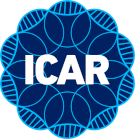Section 08 – Certificate of Quality: Difference between revisions
| Line 20: | Line 20: | ||
</div> | </div> | ||
<center></center> | |||
<center> | |||
</center> | |||
== Scope == | == Scope == | ||
Revision as of 07:08, 16 July 2024
Introduction
Preamble
The ICAR Certificate of Quality programme was established by the 2006 ICAR General Assembly. It replaced the earlier use of the permanent ICAR Special Stamp, which became invalid by 2009.
Purpose
The purpose of the ICAR certificate of quality is to support ICAR member organisations in maintaining a high quality of service in those fields of activity that ICAR has guidelines for or are otherwise within the scope of the work of ICAR, and to ensure continuous improvement in service quality.
Benefits
The benefits of the ICAR Certificate of Quality to member organisations include:
- A unique mark that identifies product and service quality for customers which meets or exceeds the published ICAR guidelines
- A marketing tool for organisations which will identify their conformance with internationally recognised standards
- A time-sensitive approval period which will ensure to customers that the service provider has routinely met the ICAR criteria thereby providing enhanced confidence in the quality of service or product received.
- A mark of the demonstrated leadership of ICAR in the international marketplace through the provision of value-added services for its members.
- An advisory review carried out by independent experts.
Scope
Figure 1 gives a pictorial summary of the main elements of this guideline.
In summary, Section 8 of the ICAR Guidelines covers the procedures from the submission of the application by a member through to the awarding of the ICAR Certificate of Quality.

